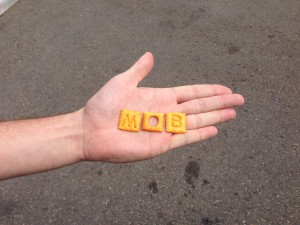Mob Programming may seem to be counter intuitive at first, however it quickly becomes evident that the ability to transfer knowledge to your whole team at the same time quickly outweighs the perceived loss in efficiency that you would normally otherwise think would result in a period of time all of your developers are sitting at one keyboard.
Analogy
Imagine programming as a large puzzle that someone must assemble, some pieces are lost under the bed and some are at your neighbors house from the last time you got together to assemble a puzzle. The puzzle pieces represent the individual bits of information you would need to actually write the code. The finished puzzle being the written and complete code. Now picture having your friends with you to help you with the puzzle. Each person found all the pieces before hand or at least know where to look for a specific piece. The act of assembling the puzzle is much like the typing of the code, it does not take a lot of time and once it is complete everyone can agree that it looks good and move on. Completing the puzzle is much faster and this is why:
Example
If 5 people work on 5 separate puzzles at the same time and each have to spend time looking for the pieces they will collectively spend that much time performing the act of looking instead of assembling. Conversely if 5 people work on 5 puzzles together they will find the correct pieces and assemble them with little to no time spent looking.
The Path
Mob Programming is an obvious path to take using this example. The technical minded often get stuck on minor things because they have to find out how to accomplish a goal. With 5 programmers looking at how to solve a problem, the answers to that problem come into focus without any wasted time. 5 programmers working together can complete work faster than 5 working apart or even in pairs.
Thanks for Reading!
In our experiences in the mob we work in, this has been extremely evident especially in regard to domain knowledge, technical knowledge and platforms used for development and business practices. The pieces are all over and each person has a piece.
